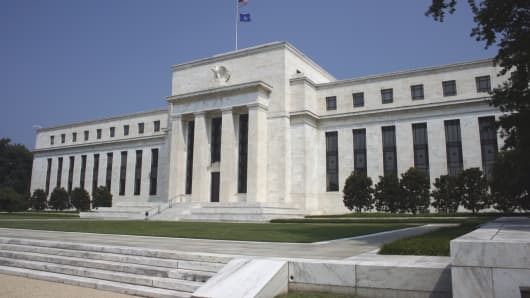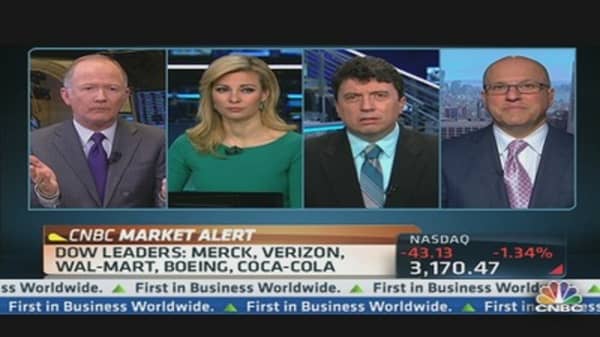"If you look at the last couple of recessions, there's a long gap between the last ease and first tightening," said Michael Cloherty, head of U.S. rates strategy at RBC Capital Markets. "We think purchases will stop at the end of 2013 but the first move in the funds rate isn't until (the third quarter of) 2015. So we think there's going to be a long gap in between."
Traders recoiled Wednesday after the Fed released minutes from its January meeting indicating that members discussed whether it might be wise to "taper" the ongoing $85 billion in monthly purchases of Treasurys and mortgage-backed securities. That's part of the third round of what is known as quantitative easing, or QE3.
(Read More: Fed Officials Divided on Future of QE)
Among the main points were that the economy soon may stabilize enough to justify the draw-down of the Fed's $3 trillion balance sheet, along with concern over the risks that come with further expansion.
"What we're expecting is for QE3 to continue through the third quarter then slow in the fourth quarter and stop. That's an extra trillion dollars in balance sheet growth," Cloherty said. "That's a massive move by any historical standard, and that's something that will very, very difficult to unwind someday."
Despite the potential long-term hazards of QE, the stock market sold off at the slightest notion that the Fed might pull the plug.
"Equity markets seem to think of asset purchases as magic pixie dust," Cloherty said. "They just make everything fly. No one has a transmission mechanism for how that works, they just know it does."
The Standard & Poor's 500 lost 1 percent following Wednesday's Fed release and was on pace to add to that decline Thursday.
The bond market, though, was humming along even though a Fed exit from bond buying would seem likely to decrease demand and thus put upward pressure on yields.
Instead, yields fell and a popular exchange-traded fund, the iShares Barclays 20+ Year Treasury Bond fund, gained nearly one percent.
(Read More: Worst Trade of the Year? Bet Against Bond Market)
But fixed income will continue to take its cues more from the Fed's zero target for its fund rate.
While the central bank has tied no specific conditions to when it will pull the plug on bond buying, it has been specific that rate normalization is a separate issue and will not begin at least until the unemployment rate falls from its current 7.9 percent to 6.5 percent and inflation, which is about 1.7 percent now, hits 2.5 percent.
"The mixed messages apparently coming from the Fed illustrate the risks of trying to guide market expectations by pre-committing to particular policies," Julian Jessop, chief global economist at Capital Economics, said in a note. "The upshot is that an early end to QE3 might not result in the surge in bond yields that some would take for granted."
From a broader perspective, market reaction in both equities and fixed income likely will be tied not merely to when easing and rate manipulation ends but why.
"If QE were scaled back due to concerns about costs rather than achieving its stated labor market goals, as some members hinted at, we would expect risk assets to sell off and Treasury yields to decline," Michael Hanson and Ethan Harris, economists at Bank of America Merrill Lynch, said in a report.
From there, financial markets will have to see how the Fed unwinds its massive balance sheet.
"This is one of those things that's going to greatly complicate the whole exit of the Fed," Cloherty said. "The further they go the more problematic all this becomes."
-By CNBC.com's Jeff Cox. Follow him on Twitter at @JeffCoxCNBCcom.





